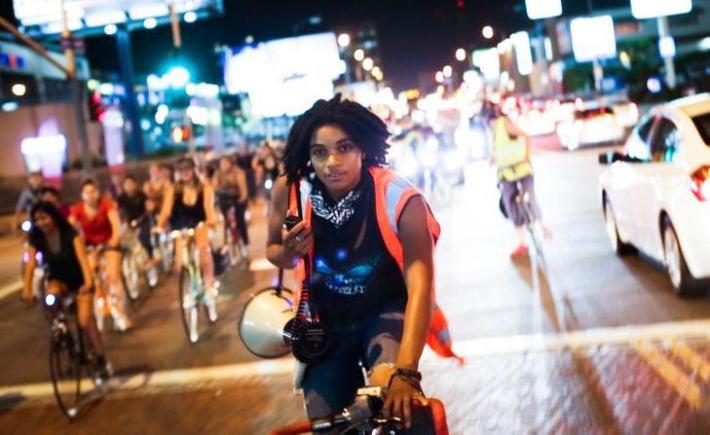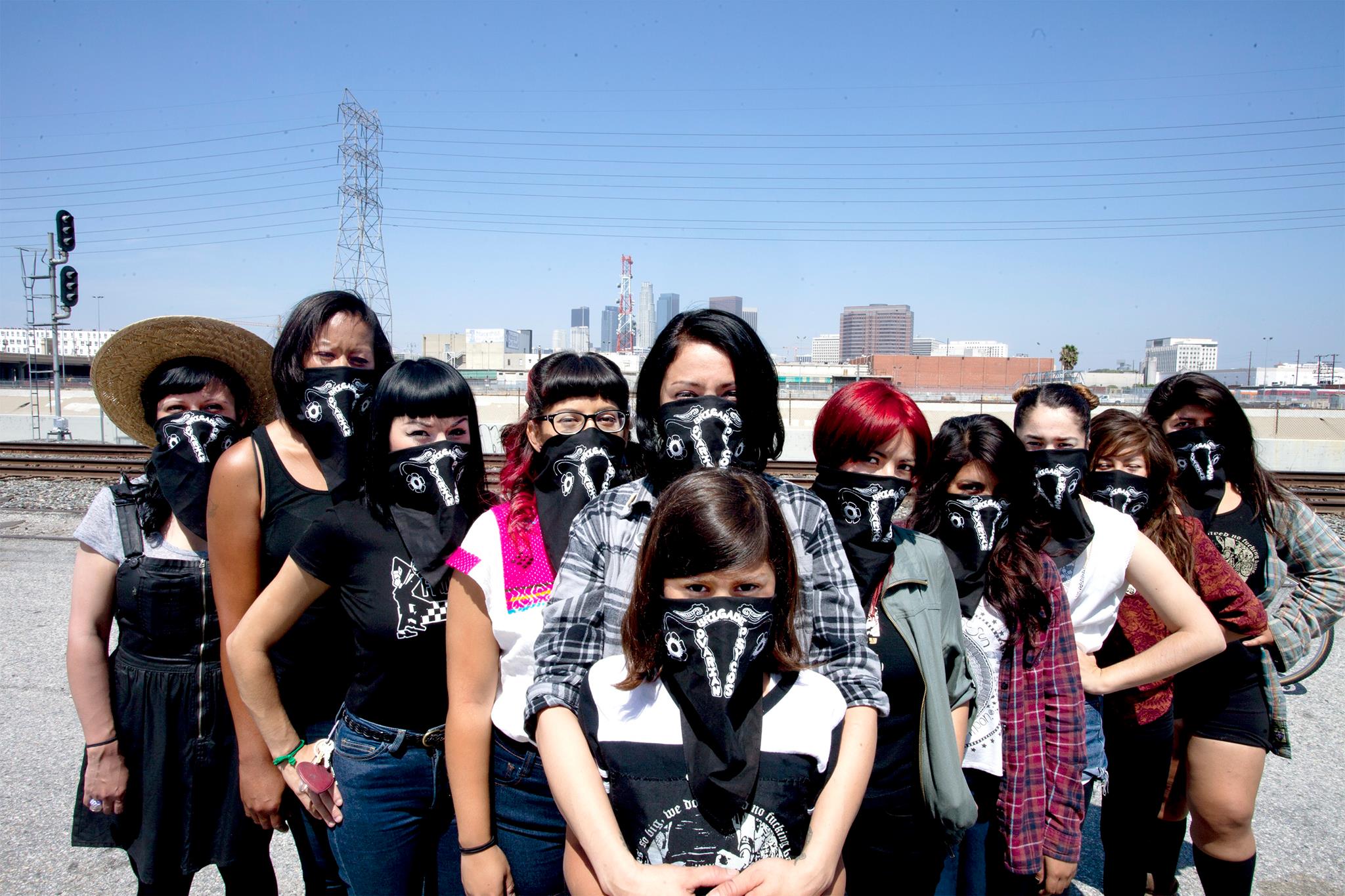[Streetsblog Chicago editor John Greenfield publishes a weekly transportation column in the Chicago Reader. We syndicate the column on Streetsblog Chicago after it comes out online.]
In December we ran an article on Streetsblog Chicago about a weekly women-only bike ride where female cyclists can enjoy cycling and hanging out without having to deal with sexism or street harassment. In addition to cisgender women, trans women and gender non-conforming people are encouraged to participate.
After checking out the piece, Streetsblog freelancer Lynda Lopez applauded the concept, but she couldn’t help noticing that almost all of the women in the photos we ran appeared to be white. “We need more spaces for women cyclists,” she tweeted, but added, “I wonder if women of color have also frequented these meetings.”
That reminded me of an influential Los Angeles bike crew called the Ovarian Psycos, newly dubbed the Ovas, which is guided by a credo of "feminist ideals with Indigena understanding and an urban/hood mentality." Established in 2010 and predominantly made up of Latina and Black women and women-identified people, it has used bicycling as a tool to organize around issues like gentrification, police abuse, and mass incarceration. The Ovas' activism has included Clitoral Mass rides, some of which have drawn hundreds of women. However, the group held its final ride earlier this month and, according to its website, is currently strategizing about how best to respond to recent threats to communities of color around the world.
"That's pretty cool," Lynda responded when I shared a story about the Ovas' past activities. "We need that intersectional approach in Chicago biking."
Chicago currently has several groups and events geared toward women-identified cyclists. For example, the organization Women Bike Chicago holds an annual Day of Dialogue and Demonstration, with seminars and how-to clinics. The community bike shops West Town Bikes and the Recyclery host popular weekly open shop nights for women, trans, and femme folks. There are also the weekly For Women Only, Duh rides and the Stabettes, a shadowy bike crew with a punk aesthetic and a Bikini Kill-like media blackout policy. In addition the Chainlink social networking site has an active women's discussion page.
In recent years, several bike organizations and events have emerged that are led by people of color and/or focus on Black and Brown communities on the South and West sides. There are the transportation advocacy groups Slow Roll Chicago and Go Bronzeville, as well as the small bike shop Bronzeville Bikes. Southside Critical Mass, which meets in Hyde Park on the first Friday of every month, and the Major Taylor Cycling Club of Chicago (named for the Black bike-racing legend) draw a largely African-American ridership.
Women's bike-repair nights at West Town and the Recyclery attract a racially diverse crowd, and West Town's Girls Bike Club program primarily serves youth of color. In addition, the Black Girls Do Bike: Chicago Facebook group has more than 400 members. A member of that group, Danielle McKinney, a technical trainer at Lurie Children's Hospital, informed me that members sometimes organize family-friendly rides.
But Lopez and I weren't aware of any other active bike organizations specifically geared towards women of color, which raised the question of whether a new group taking an intersectional approach would be a good addition to the local scene.
Lopez feels strongly that such an organization would fill a key niche. "I often find myself being one of the only bike commuters among my circle of women of color," she says. "Fear [of traffic], both legitimate and heightened, keeps a lot of women of color off bikes." She adds that a new group or crew free from "the white males and hypermasculinity often manifested in cycling spaces" would build solidarity and encourage more Black and Brown women to ride.
I reached out to 19 other Latina, Asian-American, and African-American women and genderqueer individuals who bike in Chicago to get their takes on the subject.

Community organizer Carolina Gallo says that last spring she actually tried to organize participants from a Facebook group called Womxn of Color Healing Collective into a new cycling group, but people's schedules didn't line up. ("Womxn" is an umbrella term for women and women-identified individuals.)
"Some of our concerns were the sexist attitudes of men who work in bike shops, sexual harassment while biking, and the lack of womxn of color biking spaces and bike riders," she says via e-mail. "It is extremely important [to start a new bike group] because there are certain things WOC go through, especially gender-nonconforming people, femmes, and trans womxn, that others do not. Like harassment by men on bikes, walking, at bike shops, in cars—like literally everywhere."
Journalist Anjulie Rao, who sometimes rides with Slow Roll, sounds stoked about the idea. "Connecting with women of color around the city is far more beneficial than most people understand," she says. "It's empowering and comforting." She adds that when she rides with other women, she feels safer and less likely to be cut off or insulted by men on bikes. "The unbridled aggression and passive-aggressive 'Move over, honey' comments are getting tiresome."
Sharon Samuels, an architect, artist, and designer who's involved with Bronzeville Bikes and the Major Taylor club also says a cycling group centered around women of color would be helpful for getting new people on two wheels. "Some women of color simply have not been exposed to cycling as a way to add fitness and fun to your life," she writes, adding that in many communities of color biking generally isn't viewed as a realistic transportation option, and women may feel unsafe riding alone.
Angela Ford, a real estate consultant who runs a sustainability nonprofit called the T.A.G. Foundation says she was previously associated with a women's biking group made up of mostly of white cyclists. "I was loosely involved for between six months to a year. Essentially, I felt like a square peg trying to fit in a round hole." Ford added that she's aware of many informal circles of African-American women who ride together regularly, and she's working with a few people on starting a new group.
Urban gardener Taryn Randle grew up on the southeast side and currently splits her time between Chicago and Los Angeles. She's something of an expert on the subject, since she's been an active rider and organizer with the Ovas, plus a small, weekly Englewood-based ride that's open to all genders called #2wheelgods. She also participates in Slow Roll and Southside Critical Mass events.
"I absolutely think a bike group geared towards creating a safe space for womyn of color, trans and gender-nonconforming folk would be beneficial," Randle says via e-mail. "Group rides act as a perfect way to expose people to cycling in a fun, supported, and communal way. They have the potential to be a platform for getting [politically] organized while at the same time healing and releasing."
If the new bike group launches, it needs to be of, by, and for women of color, Randle says. "It has to start from the inside. Things birthed by necessity happen organically. Perhaps starting the conversation is exactly what is needed to see who feels it's needed. Those are the ones that will make it happen."






